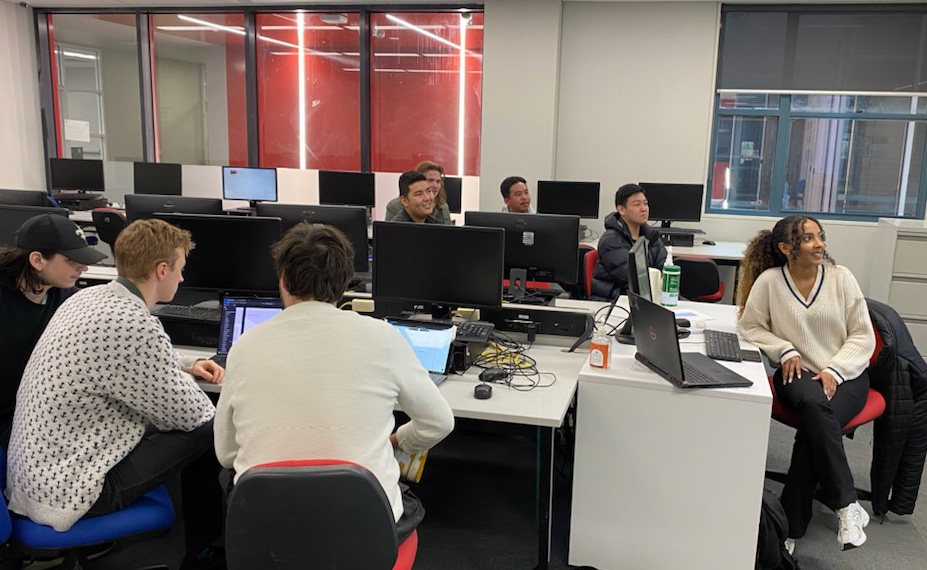Swinburne students provide tech talent for non-profits

Students from Swinburne’s Diploma of Information Technology (Front End Web Development) and Diploma of Information Technology (Advanced Programming) are collaborating to create websites for two not-for-profit organisations.
In summary
- Swinburne vocational education students are collaborating to create websites for two not-for-profit organisations
- The projects showcase Swinburne students’ industry training in creating modern, updatable, dynamic websites
- ‘Learning by doing’ is part of Swinburne’s guarantee to provide students with industry experience
‘Learning by doing’ is part of Swinburne University of Technology’s guarantee to provide our learners with industry experience. This commitment to merge the world of study and work extends to our Vocational Education and Training (VET) students.
This year, students from Swinburne’s Diploma of Information Technology (Front End Web Development) and Diploma of Information Technology (Advanced Programming) are collaborating to create websites for two not-for-profit organisations.
The Boroondara Stroke Support Group needs a completely redesigned and completed website. The new website will feature a calendar that can be dynamically updated by its members with weekly events. This is currently a time-consuming, inefficient task that Swinburne programming students will be streamlining.
The second project is a website for EdAble, which supports micro businesses for people with disabilities and advocates for the employment of this group in medium and large businesses. The students will set up a complex system that enables people to donate money for specific items required by the micro businesses.
Graham Bridge, ICT Course Coordinator at Swinburne, says students are being trained to take the tech jobs of tomorrow, today.
“Workplaces are looking for innovative solutions to the problems they’re experiencing, as well as the talent required for a future defined by technology,” says Bridge.
“These projects allow our students to showcase their industry training in creating modern, updatable, dynamic websites for the benefit of community organisations.”
Olga Lavouasier, Manager ICT (VET) at Swinburne is working with students and their teachers to have the finished websites handed over to the respective clients in late November.
“All our ICT courses have embedded industry immersion and live projects where possible,” says Lavouasier.
“Each course has several industry partners attached to it to deliver workshops, presentations and to act as a community of practice for our students to access as mentors.”
Previously, Diploma of Digital Media Technology students redesigned a website for Kara Family Violence Service (formerly Kara House) aimed at potential donors, volunteers and people in potentially abusive relationships.
Ruby Lampard, Development Officer at Kara Family Violence Service, says the involvement of Swinburne’s ICT students was vital.
“It was wonderful to work with the Swinburne students to totally redevelop our very out-of-date website,” says Lampard.
“Right from the initial brief the students were on board and engaged in understanding how much a new website could make a difference in the lives of women and children facing family violence.
“They developed innovative solutions that met the brief, a standout design, coded the site from scratch and were incredibly professional throughout the whole process. The design, functionality and ease of use was beyond our expectations.
“The project gave us the opportunity to collaborate with a team of students whose skill set enabled the development of a website that has played a pivotal role in communicating to clients, community sponsors and industry colleagues and, most importantly, helping our clients move toward a safer future.”
-
Media Enquiries
Related articles
-

- Technology
- Science
- Engineering
Victorian students drive green energy transition through international hydrogen competition
Swinburne’s KIOSC, in collaboration with Horizon Educational and Gippsland Tech School, co-hosted the Hydrogen Grand Prix in Melbourne.Friday 26 July 2024 -

- Student News
- Film and television
Swinburne students curate "Wrestling with Reality" film season for ACMI's Cinema 3
Students from Swinburne's Cinema and Screen Studies program launch curated film season on ACMI’s streaming platform, Cinema 3.Tuesday 23 July 2024 -

- Technology
- Health
New MedTechVic prototypes to transform everyday lives of people with a disability
Swinburne’s MedTechVic has revealed three new prototypes designed through the joint Health-led Manufacturing Innovation Program, in partnership with the Australian Medtech Manufacturing Centre and Safer Care Victoria
Friday 19 July 2024 -

- University
Meet the Swinburne students and alumni at the Paris Olympics and Paralympics
Swinburne students and alumni are making their mark at the 2024 Olympic and Paralympic Games in Paris. Meet the six Swinburne athletes who are taking on the world.
Wednesday 17 July 2024 -

- Student News
Vygo: Support at students’ fingertips
Swinburne University of Technology students will have personalised support and peer-to-peer learning at their fingertips with the new Vygo app.
Thursday 25 July 2024

